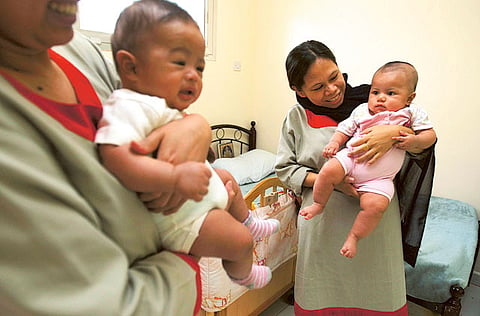UAE inmates given chance to put lives back on track
Exclusive tour of Ajman jail highlights steps taken to promote inmates’ rehabilitation

Ajman: Prisoners at Ajman Central Jail are treated with dignity and given the opportunity to put their lives back on track, Gulf News learnt during a tour of the facility.
The newspaper was given an exclusive tour of the jail, located in the middle of Al Jurif. The prison is home to more than 600 inmates, including 70 women. Ten per cent of the prisoners are Emirati.
The prison operates like a small town. It has a medical centre, supermarket, etisalat cabin, education centre and a craft workshop. A unified Azan system — the first of its kind in the world to operate in a jail, is released from Shaikh Zayed Mosque and there is access to a small area that serves as a mosque.
There is an ‘open-door policy’ and prisoners are encouraged to discuss any problems they may have with staff. Brigadier General Ali Alwan, Commander-in-Chief of Ajman Police, visits the jail regularly and personally follows up inmates’ issues.
‘Health is a priority’
Colonel Mubarak Khalfan Rizzi, director of penal and correctional institutions, said the priority was to keep the prisoners clean and healthy and to run rehabilitation programmes to prevent them from returning to a life of crime.
No matter what their crime, they will be always treated as human beings in need of attention and rehabilitation, he said.
To keep the large number of convicts in check, strict measures are taken from the moment a prisoner arrives. An inmate’s first port of call is the registration section. Registration is carried out electronically and Ajman is the first emirate to use this modern paperless system.
All registration procedures are followed up by Brigadier General Alwan. Inmates are issued identity cards that also serve as a debit card in the prison supermarket. Money can also be deposited in the card from relatives. The move for cash to be transferred by relatives is considered the first of its kind in the .
“The electronic system is a comprehensive inmate management system. From intake to release, information on all aspects of an inmate’s incarceration is maintained — including initial intake, charges, sentencing, property, housing, medical, planning, scheduling and temporary release,” he said.
The system has been praised by a number of foreign delegations who visited Ajman Jail and asked the administration to help them set up the same system in their own countries’ jails.
Facilities
The prison administration keeps the inmates’ belongings and gives them “inmate baskets” containing clothes, shoes and toiletries. When they are released their belongings are handed back to them.
Next, the prisoners receive their uniforms: a blue shirt and trousers with a colour-coded stripe around the chest indicating their sentence. A red stripe indicates a sentence of more than seven years, yellow for three to seven years, blue for three years to six months and green for less than six months.
Finally, they undergo a medical check-up and are placed in quarantine until the results of their blood tests are processed. Once the registration process is complete, the prisoner is assigned to a cell.
The inmates are assigned a daily activity depending on which rehabilitation programme they have been entered into.
The rehabilitation can be either vocational or give inmates the opportunity to further their education. The jail administration has signed an agreement with Ajman Educational Zone to follow up with the academic standard of inmates. The inmates also have breaks during which they can spend some time in the exercise ground or borrow books from the library.



